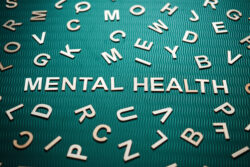What Does Strong Mental Health Look Like?

The topic of mental health currently remains one of the most common topics of discussion. From social media posts to everyday conversation, to chats with your close friend or counselor, mental health persists as something we all strive towards.
But why? What exactly is mental health, why is it so important and how can I work to improve it in my own life?
We’re glad you asked.
What is mental health?
If you run an internet search asking, “What is mental health,” you’ll be offered a number of sources with a variety of definitions that more or less boil down to the same thing:
Mental health is, in general, our emotional, psychological and behavioral well-being, as well as our ability to appropriately be affected by, interpret and respond to day-to-day occurrences, be they new, stressful or routine.
According to the World Health Organization, mental health “is more than just the absence of mental disorders or disabilities,” and is actually “fundamental to our collective and individual ability to think, emote, interact with each other, earn a living and enjoy life.”
Just as with your physical health, the status of your mental health directly impacts your quality of life.
Why is mental health important?
Have you ever gone to work or school with a cold? It’s hard to know which is worse — the cold or trying to continue on with life as normal in addition to the cold.
The same goes for mental health. There are a vast number of mental health conditions that make even the most routine activities seem incredibly difficult. Consider, for example, a mind plagued with anxiety — it’s unfair to expect an individual struggling with anxiety to effectively complete a day’s worth of work productively because their mind is trapped thinking about other things.
Not only does poor mental health inhibit your ability to work effectively, but it can also severely impact other areas of life, including:
- Relationships with friends and family members;
- Your ability to be fully engaged in the present moment;
- Caregiving, as in the case of a parent, guardian or grandparent;
- School;
- Physical health (a number of links point to the interconnectedness of physical and mental health);
- How you respond to times of stress, crisis or general disruptions in routine.
Mental health overall impacts the quality of life, meaning the stronger your mental health is, the more equipped you are to handle the twists and turns of life.
If you are concerned that your mental health isn’t as strong as you’d like it to be, there is no need to worry. Even those with the firmest mental health have difficult days and encounter situations that challenge their resilience. The key is learning to strengthen that resilience.
How can I improve my mental health?
No matter where you think your mental health levels are, there are always habits and routines you can implement to continue strengthening mental health and building resilience.
- Journal: Even a brief gratitude journal of three-to-five things you were grateful for during the day can significantly increase a positive attitude and outlook on life.
- Take it slow: Slow mornings set the tone for a restful day, so maybe give yourself a slow morning once a week with some fresh coffee, homemade breakfast and a favorite book.
- Get creative: Creativity can be anything — gardening, cooking, drawing, painting, DIYing, woodworking, you name it. Investing in your hobby can relieve stress and fill your time with productive activity.
- Detox from screens: Consider keeping all devices, including phones, powered down for the day and relish the feeling of falling off the grid.
- Take a bath: A hot soapy bath, complete with essential oils, relaxing background music, a mug of tea and a good book can go a long way in resetting your mood.
- Explore: Go on a hike, visit a farmer’s market, wander through an antique store, relax on the beach, try a new restaurant or check out a city museum. You’ll be amazed at how many hidden treasures you can find in your local area.
- Adopt a pet: If you’re financially able to, and up to the rewarding challenge of providing for an animal, living with a four-legged friend can be incredibly comforting, be they a cat, dog or something else.
- Exercise: Whether it’s a walk around the block, kick-boxing lessons, spin class, yoga sessions or 30 minutes on the treadmill, routinely moving and working your body is proven to bolster both mental and physical health.
- Spending time with friends: Community is very important for one’s mental health, as it reduces symptoms of depression related to isolation and loneliness. Plus, conversation with good, healthy friends offers new perspectives, various outlooks and even joy.
Obviously, this is not an all-inclusive list of mental health-boosting activities. Anything that relaxes your mind or brings you a sense of peace can increase mental health. Reflect on what that looks like in your life and invest time accordingly!
Contact a mental health professional
As always, mental health professionals, like therapists and counselors, dedicate their lives to helping clients increase their mental health to achieve the highest quality of life. If you desire to speak with a counselor as a means of evaluating and improving your mental health, the professionals at Pyramid Healthcare are here for you.
Reach out to Pyramid Healthcare at any time by calling 888-694-9996.
The topic of mental health currently remains one of the most common topics of discussion. From social media posts to everyday conversation, to chats with your close friend or counselor, mental health persists as something we all strive towards.
But why? What exactly is mental health, why is it so important and how can I work to improve it in my own life?
We’re glad you asked.
What is mental health?
If you run an internet search asking, “What is mental health,” you’ll be offered a number of sources with a variety of definitions that more or less boil down to the same thing:
Mental health is, in general, our emotional, psychological and behavioral well-being, as well as our ability to appropriately be affected by, interpret and respond to day-to-day occurrences, be they new, stressful or routine.
According to the World Health Organization, mental health “is more than just the absence of mental disorders or disabilities,” and is actually “fundamental to our collective and individual ability to think, emote, interact with each other, earn a living and enjoy life.”
Just as with your physical health, the status of your mental health directly impacts your quality of life.
Why is mental health important?
Have you ever gone to work or school with a cold? It’s hard to know which is worse — the cold or trying to continue on with life as normal in addition to the cold.
The same goes for mental health. There are a vast number of mental health conditions that make even the most routine activities seem incredibly difficult. Consider, for example, a mind plagued with anxiety — it’s unfair to expect an individual struggling with anxiety to effectively complete a day’s worth of work productively because their mind is trapped thinking about other things.
Not only does poor mental health inhibit your ability to work effectively, but it can also severely impact other areas of life, including:
- Relationships with friends and family members;
- Your ability to be fully engaged in the present moment;
- Caregiving, as in the case of a parent, guardian or grandparent;
- School;
- Physical health (a number of links point to the interconnectedness of physical and mental health);
- How you respond to times of stress, crisis or general disruptions in routine.
Mental health overall impacts the quality of life, meaning the stronger your mental health is, the more equipped you are to handle the twists and turns of life.
If you are concerned that your mental health isn’t as strong as you’d like it to be, there is no need to worry. Even those with the firmest mental health have difficult days and encounter situations that challenge their resilience. The key is learning to strengthen that resilience.
How can I improve my mental health?
No matter where you think your mental health levels are, there are always habits and routines you can implement to continue strengthening mental health and building resilience.
- Journal: Even a brief gratitude journal of three-to-five things you were grateful for during the day can significantly increase a positive attitude and outlook on life.
- Take it slow: Slow mornings set the tone for a restful day, so maybe give yourself a slow morning once a week with some fresh coffee, homemade breakfast and a favorite book.
- Get creative: Creativity can be anything — gardening, cooking, drawing, painting, DIYing, woodworking, you name it. Investing in your hobby can relieve stress and fill your time with productive activity.
- Detox from screens: Consider keeping all devices, including phones, powered down for the day and relish the feeling of falling off the grid.
- Take a bath: A hot soapy bath, complete with essential oils, relaxing background music, a mug of tea and a good book can go a long way in resetting your mood.
- Explore: Go on a hike, visit a farmer’s market, wander through an antique store, relax on the beach, try a new restaurant or check out a city museum. You’ll be amazed at how many hidden treasures you can find in your local area.
- Adopt a pet: If you’re financially able to, and up to the rewarding challenge of providing for an animal, living with a four-legged friend can be incredibly comforting, be they a cat, dog or something else.
- Exercise: Whether it’s a walk around the block, kick-boxing lessons, spin class, yoga sessions or 30 minutes on the treadmill, routinely moving and working your body is proven to bolster both mental and physical health.
- Spending time with friends: Community is very important for one’s mental health, as it reduces symptoms of depression related to isolation and loneliness. Plus, conversation with good, healthy friends offers new perspectives, various outlooks and even joy.
Obviously, this is not an all-inclusive list of mental health-boosting activities. Anything that relaxes your mind or brings you a sense of peace can increase mental health. Reflect on what that looks like in your life and invest time accordingly!
Contact a mental health professional
As always, mental health professionals, like therapists and counselors, dedicate their lives to helping clients increase their mental health to achieve the highest quality of life. If you desire to speak with a counselor as a means of evaluating and improving your mental health, the professionals at Pyramid Healthcare are here for you.
Reach out to Pyramid Healthcare at any time by calling 888-694-9996.







